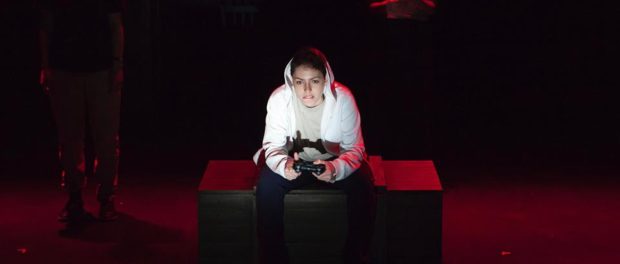Power Shapes: Docile Bodies
Docile Bodies, an original devised production by Wig in a Box, explores how six soldiers who are at odds with power experience the lingering effects of their encounter. Through intimate monologues, each soldier reveals the extent of his or her disassociation from normalcy as the scars of the experiences are gradually revealed. Each is transformed, but in different ways.
This show is ambitious in scope, using dance and movement just as much as monologue. Each “piece” is intersp ersed with shorter group vignettes. The actors (Béata Groves, Laura Beaudouin (replacing Lucy Fandel), Émilie Slotine, Emily Sirota, Sarah Foulkes, and Natalie Liconti) are on stage almost entirely and in constant motion, taking on roles as needed.
The performances are somewhat uneven, though all actors are strong in their respective domains. The audience walks into the theatre as the six soldiers race back and forth across the stage to a timer. I pondered if this would be an unfortunate hour of abstraction around the concept of Foucault’s “docile bodies”, an idea that the body is shaped and trained by the powers that act upon it. Luckily, this did not continue for long and the six stories soon gave an alternate reading of this theme.

Emily Jane. Docile Bodies. Wig in a Box facebook page.
The initial “monologue” is the oddest of the group. It features a sailor (Laura Beaudouin) who recounts a hazing ritual that she has undergone after reaching a certain amount of time at sea. While the other actors repeat the lines of the narrative in a disorienting way, Beaudouin begins to dance. The dance captures the helplessness of being thrown about by the waves and the struggle to fight against a force far greater than oneself. This piece is far less about the character than the others that follow, though beautifully done.
After this, we meet a series of other soldiers, including an Israeli commander (Emily Jane) who takes his soldiers to a gay goth club and a drone operator (Emilie Slotine) whose alluded-to childhood sexual abuse has made her uncomfortable in her body. While Slotine speaks, the others shift around her like avatars in a video game, giving a deeply satisfying visual to the creepiest of the monologues. Overall, the actors’ ability to convey the complex personalities of these characters and the range of impact of their experiences is commendable. The physicality of the piece as well as its thoughtful text makes it interesting.
The intermediary vignettes also addressed the themes raised in the piece. I was particularly struck by a boxing match that transforms into another type of connection and a nasty competition to describe two famous experiments from the world of social pscyhology (the Milgram experiment on obedience and Zimbardo’s prison experiment). Others, such as a dance performed to the song Push It, still leave me uncertain as to their purpose in the overall piece.
One other aspect to Docile Bodies that bears mention is how it addressed gender and queerness. The actors, all female, take on the roles of both men and women. Sometimes the gender of the speaker is withheld or only hinted at, allowing for some ambiguity. One piece specifically addresses the challenges of being a lesbian in the military, while others seem to focus more on toxic masculinity.
Docile Bodies isn’t an easy piece to watch, but well worth the discomfort. It is provocative and leaves the viewer with much to think about. The smooth integration of music and lighting, the issues raised, and the strong acting make this an important piece to add to one’s Fringe Festival calendar.
Docile Bodies is playing at the MAI on Friday June 9 at 24, June 11 at 18:30, June 13 at 24, June 14 at 21:45, June 15 at 19, and June 17 at 17:15. For tickets, click HERE.






